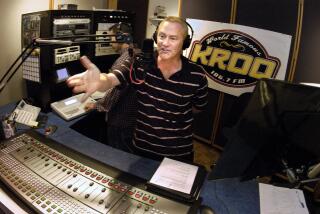OWENS WILL RIDE KKGO-FM AIRWAVES
- Share via
The man who gave new meaning to such phrases as craven scum and indulging in persiflage, simply by using them so often between records, returns to morning drivetime next month.
Bernard Altman, perhaps the best-known personality in Los Angeles radio, resumes deejay duties at all-jazz KKGO-FM (105.1), just in time to celebrate his 25th anniversary in Los Angeles radio.
Of course, Altman is better known (even to himself) by the stage name he assumed shortly after taking to the airwaves back in 1952. He is now Gary Owens to everyone but the eldest of Altmans.
Beginning Sept. 26, Owens will take on the same 6-10-a.m. shift he held for several years at KPRZ-AM until that Big Band station switched its format to Top 40 and its call letters to KIIS-AM last January. Since then, Owens has been an off-the-air vice president for Gannett Broadcasting, acting as an emcee and good-will ambassador for the company. Gannett owns both KIIS-AM and FM, as well as 13 other radio stations throughout the United States.
Owens said he has gotten used to sleeping in late since the demise of KPRZ, so he plans to call in the first hour of his new program from his car phone.
“He’s going to be our Rick Dees,” said KKGO owner and general manager Saul Levine.
Which raises the sticky question of just how Owens is able to work for Levine’s KKGO while remaining on the payroll of Dees’ home base just down the dial: KIIS-FM (102.7).
“I’m not just on the payroll of KIIS,” he said. “I’m on the payroll of 15 different Gannett stations. And this being a jazz-oriented format, it was decided that it would not interfere with the KIIS contemporary hit format.”
Owens did receive, and consider, offers from stations he characterized as “head-to-head” rivals of KIIS, but ultimately opted for KKGO because its jazz audience and Dees’ Top 40 listeners rarely cross demographic paths.
KKGO’s mornings will follow the full personality approach to drivetime, however. Levine said he is hiring a newscaster and airwatch service to trade quips and information with Owens, much the same as Dees does with his news, sports and traffic-watch sidekicks.
His Gannett executive status--combined with his lucrative career as a voice-over announcer for commercials, movies and cartoon characters--made Owens eligible for early residual retirement years ago. But, like a trichinosis victim, the ham in Owens got the best of him.
“I really missed being on the air in L.A.,” he said in a rare burst of solemnity. Owens does host a weekly Top 40 syndicated program called “Supertracks,” but the closest market airing the program is in San Luis Obispo--in part because of the KIIS conflict.
Trying to explain his on-air urge in more philosophical terms, Owens puts it this way: You can take the kid out of show business, but you can’t take the business out of show.
Another Los Angeles personality coming up on his 25th anniversary in radio is veteran traffic watcher and Lohman and Barkley straight man Bruce Wayne.
Wayne, who started reporting from a helicopter over Boston in 1961, spent the weekend in Houston where the National Aviation and Space Administration honored him as a “special aviator” by putting him through the same weightlessness training that astronauts undergo.
His fun-and-pun reports over Southern California freeways for KFI-AM (640) and KOST-FM (103.5) may be entertaining, but Wayne’s wife and chief publicist, Lois, also says it’s dangerous.
For more than a year, she has been gathering information for a book on radio airwatch specialists like her husband. She’s settled on the working title of “Asphalt Angels” and will concentrate on men like Francis Gary Powers and Capt. Max Schumacher, who lost their lives reporting traffic jams. Both airwatchers, and several others like them across the United States, died in helicopter accidents.
“It’s very hazardous. Most people don’t know that,” she said. “It’s stressful too. Heart attacks are very high among them.”
Cardiac arrest appears to be a real hazard among TV game-show contestants too, judging by the reaction Pat Sajak is able to elicit from them by spinning the wheel of fortune.
Recently, the wheel has come to radio.
KGIL, KFOX and KIEV have all dabbled in trivia games over the past year, but this month KFI has become the first Los Angeles station to inflict an array of games on its unsuspecting audience in a major way.
From 6 to 9 p.m. Monday through Saturday, lucky listeners get to hear deejay Mark Richards play applause sound effects and push buzzers, bells and other game-show noise buttons while asking call-in contestants to answer the same inane questions that Richard Dawson or Bill Cullen ask of TV contestants.
For their efforts, the winners earn big prizes: theater tickets, trivia board games and as much as $25 in cash.
More to Read
The biggest entertainment stories
Get our big stories about Hollywood, film, television, music, arts, culture and more right in your inbox as soon as they publish.
You may occasionally receive promotional content from the Los Angeles Times.










